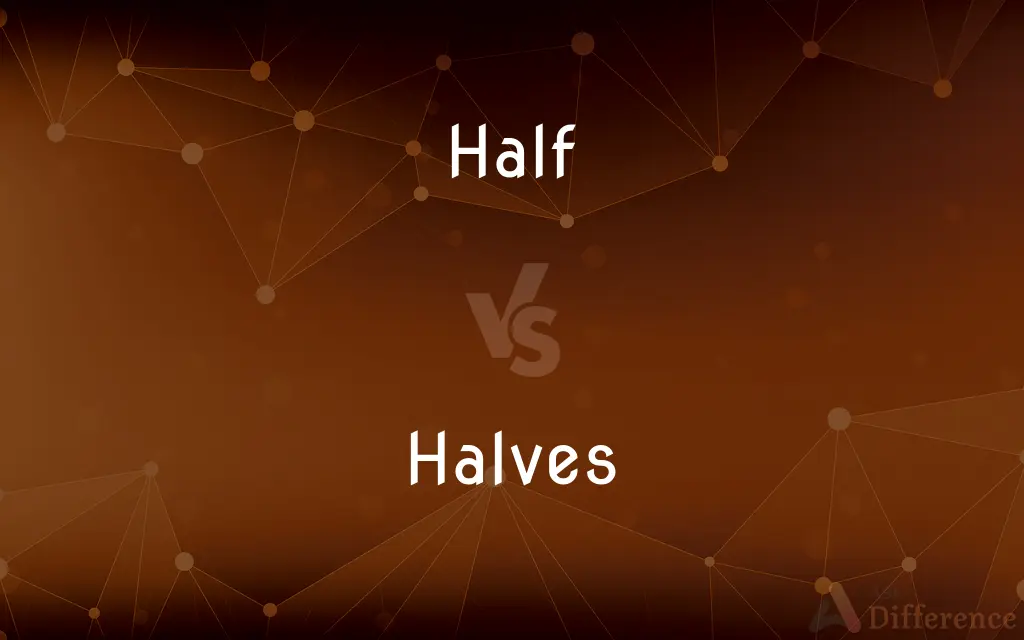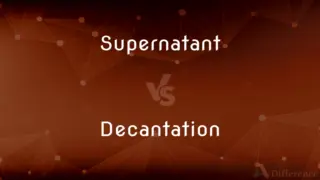Half vs. Halves — What's the Difference?
By Urooj Arif & Fiza Rafique — Updated on March 30, 2024
"Half" refers to one of two equal parts of something, used as both a noun and an adjective, while "halves" is the plural form of half, indicating two segments that together make a whole.

Difference Between Half and Halves
Table of Contents
ADVERTISEMENT
Key Differences
Half, in its singular form, describes a situation where something is divided into two equal portions, whether discussing time, quantity, or division of objects. For instance, cutting a cake into two equal parts results in each person receiving half. On the other hand, halves specifically refers to the two individual sections that, when combined, constitute the original whole. If you divide an apple into two pieces, each piece is a half, and together, they are referred to as halves.
When used as an adjective, "half" can describe a partial aspect of something, such as half-full or half-empty, indicating that something is not complete but occupies 50% of the possible capacity. Conversely, "halves" does not function as an adjective because it always refers to the two parts of a whole, emphasizing the division rather than the degree of completeness.
The concept of half is essential in mathematics, fractions, and measurements, serving as a foundational idea for dividing entities into two equal segments. Whereas, when talking about halves, the discussion inherently involves the relationship between these two segments and their collective representation of the whole entity.
In everyday language, "half" can also metaphorically represent a significant, yet not complete, portion of a broader aspect, such as "half the battle" or "half the fun". The use of "halves" in language, however, often pertains to very specific contexts where the division of something into two equal parts is discussed, such as "the halves of a football match" or "bringing two halves together to make a whole".
The differentiation between half and halves underlines not only the numerical and quantitative distinctions but also the way we conceptualize division, completeness, and the relationship between parts and wholes in both physical and abstract terms.
ADVERTISEMENT
Comparison Chart
Definition
One of two equal parts of a whole.
The two equal parts that together make up a whole.
Usage as Part of Speech
Used as a noun and an adjective.
Used only as a noun.
Example Usage
Cutting an apple into two pieces gives you half an apple.
Dividing an apple into two pieces results in two halves.
Conceptual Use
Can denote a significant portion, not necessarily physical.
Specifically refers to the physical division into two parts.
Plurality
Singular, referring to one part out of two.
Plural, emphasizing the two parts as a collective.
Mathematical Context
Fundamental in understanding fractions and division.
Used to discuss the result of division into two parts.
Compare with Definitions
Half
Signifying one of two equal portions of a whole.
She drank half the glass of water.
Halves
Refers to the result of splitting one entity into two.
The halves of the broken vase were glued back together.
Half
As an adjective, it denotes partiality.
The half-empty auditorium echoed with applause.
Halves
In specific contexts, denotes the segments of a period or event.
The game has two halves, each lasting 45 minutes.
Half
Used to describe a 50% portion or extent.
Half of the students passed the exam.
Halves
The two parts that form a whole when combined.
The two halves of the locket fit perfectly together.
Half
Relates to fractions and division in mathematics.
Half of 8 is 4.
Halves
Used when something is divided equally into two.
The class was divided into halves for the game.
Half
Can indicate a significant but not whole part.
Solving the puzzle is only half the challenge.
Halves
Emphasizes the relationship between the parts and the whole.
Both halves of the debate team argued convincingly.
Half
One of two equal parts that together constitute a whole.
Halves
Plural of half.
Half
One part approximately equal to the remaining part.
Halves
Plural of half
Half
(Informal) A 50-cent piece.
Half
One of the two playing periods into which certain games are divided.
Half
A halfback.
Half
Chiefly British A school term; a semester.
Half
Half an hour
A half past one.
Half
Being one of two equal parts.
Half
Being approximately a half.
Half
Partial or incomplete
Gave me a half smile.
Half
To the extent of exactly or nearly 50 percent
The tank is half empty.
Half
Not completely or sufficiently; partly
Only half right.
Half
One of two usually roughly equal parts into which anything may be divided, or considered as divided.
I ate the slightly smaller half of the apple.
You don’t know the half of it.
Of the passengers on the plane, half were English.
The cake was delicious: half was vanilla and half was chocolate.
Half
(sports) One of the two opposite parts of the playing field of various sports, in which each starts the game.
Half
Half of a standard measure, chiefly: (British) half a pint of beer or cider.
Half
(preceded by “a” or a number) The fraction obtained by dividing 1 by 2.
Three-quarters minus a quarter is a half.
Half
Any of the three terms at Eton College, for Michaelmas, Lent, and summer.
Half
(slang) A half sibling.
Half
A child ticket.
Half
(sports) abbreviated form for half marathon.
Half
(numismatic slang) half-dollar
Half
Consisting of a half (½, 50%).
A half kilo
A half hour
A half dollar
Half
Consisting of some indefinite portion resembling a half; approximately a half, whether more or less; partial; imperfect.
A half truth
Half
(of a sibling) Having one parent (rather than two) in common.
Half
(of a relative other than a sibling) Related through one common grandparent or ancestor rather than two.
Half
In two equal parts or to an equal degree.
Half
In some part approximating a half.
Half
Partially; imperfectly.
Half done
Half persuaded
Half conscious
He does sometimes half wish to change his life, but it is too difficult.
Half
Practically, nearly.
Half
To halve.
Half
Half past; a half-hour (30 minutes) after the last hour.
The time is 9:30; it is half nine.
Half
A half-hour to (preceding) the next hour.
In some countries, "half seven" means 6:30.
Half
(theatre) A call reminding performers that the performance will begin in thirty minutes.
Half
Consisting of a moiety, or half; as, a half bushel; a half hour; a half dollar; a half view.
Half
Consisting of some indefinite portion resembling a half; approximately a half, whether more or less; partial; imperfect; as, a half dream; half knowledge.
Assumed from thence a half consent.
Half
In an equal part or degree; in some part approximating a half; partially; imperfectly; as, half-colored, half done, half-hearted, half persuaded, half conscious.
Their children spoke halfin the speech of Ashdod.
Half
Part; side; behalf.
The four halves of the house.
Half
One of two equal parts into which anything may be divided, or considered as divided; - sometimes followed by of; as, a half of an apple.
Not half his riches known, and yet despised.
A friendship so completePortioned in halves between us.
Half
To halve. [Obs.] See Halve.
Half
One of two equal parts of a divisible whole;
Half a loaf
Half an hour
A century and one half
Half
In various games or performances: either of two periods of play separated by an interval
Half
Consisting of one of two equivalent parts in value or quantity;
A half chicken
Lasted a half hour
Half
Partial;
Gave me a half smile
He did only a half job
Half
(of siblings) related through one parent only;
A half brother
Half sister
Half
Partially or to the extent of a half;
He was half hidden by the bushes
Common Curiosities
Can "half" refer to one of two parts in any situation?
Yes, "half" can refer to one of two equal parts in both physical divisions and abstract concepts, indicating a portion that constitutes 50% of a whole.
Can "halves" be used in a non-physical context?
Typically, "halves" refers to the physical division of something, but it can metaphorically describe complementary aspects that make a whole.
What does it mean when something is divided into half?
It means something is split into two equal parts, with each part representing 50% of the original.
How is "half" used in measurements?
"Half" is used to denote 50% of a unit of measurement, such as half a meter or half an hour.
Why is it important to distinguish between half and halves?
Distinguishing between the two helps in accurately describing the division of objects or concepts into equal parts and their relation to the whole.
What is an example of "halves" in sports?
Many sports, like soccer and basketball, are played in two halves, each constituting half the game's total time.
How do "half" and "halves" relate to fractions?
"Half" is a fundamental concept in understanding fractions, indicating a division by two, while "halves" are the result of this division, representing the two equal parts.
Is "halves" always plural?
Yes, "halves" is the plural form of "half" and is used when referring to both parts of something divided into two equal portions.
Can "half" be used metaphorically?
Yes, "half" can be used metaphorically to represent a significant portion of something more abstract, like effort or experience.
How do "half" and "halves" function in a sentence?
"Half" can function as both a noun and an adjective, indicating one part of two equal parts, while "halves" is used as a noun to refer to both parts collectively.
Share Your Discovery

Previous Comparison
Retailer vs. Dealer
Next Comparison
Supernatant vs. DecantationAuthor Spotlight
Written by
Urooj ArifUrooj is a skilled content writer at Ask Difference, known for her exceptional ability to simplify complex topics into engaging and informative content. With a passion for research and a flair for clear, concise writing, she consistently delivers articles that resonate with our diverse audience.
Co-written by
Fiza RafiqueFiza Rafique is a skilled content writer at AskDifference.com, where she meticulously refines and enhances written pieces. Drawing from her vast editorial expertise, Fiza ensures clarity, accuracy, and precision in every article. Passionate about language, she continually seeks to elevate the quality of content for readers worldwide.














































